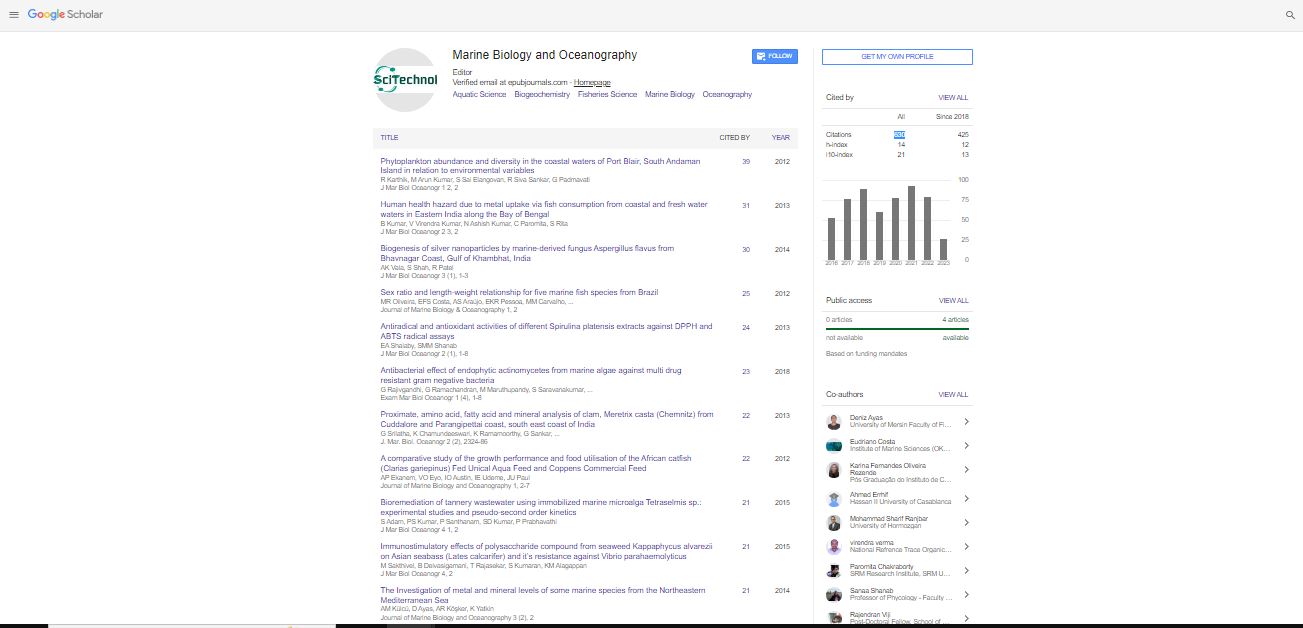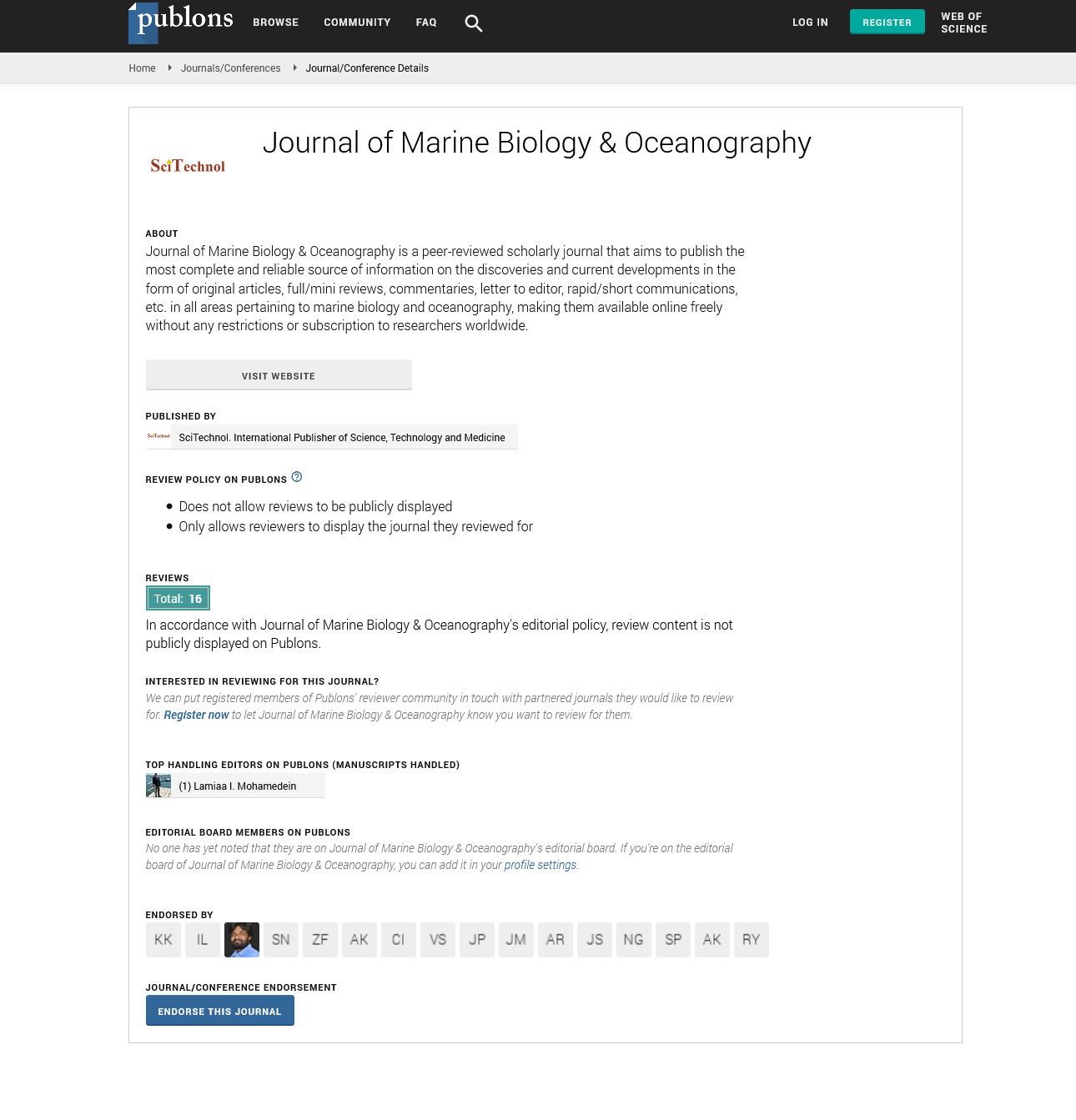Opinion Article, J Mar Biol Oceanogr Vol: 12 Issue: 1
Impact of Ocean Acidification and Micro-Plastics on Health of Marine Mussel
Shen Yanan*
Department of Marine and Environmental Research, University of Algarve, Faro, Portugal
*Corresponding Author: Shen Yanan
Department of Marine and Environmental, Research, University of Algarve, Faro, Portugal
E-mail: Shenyan@ag123.pt
Received date: 14 February, 2023, Manuscript No. JMBO-23-91848;
Editor assigned date: 16 February, 2023, PreQC No JMBO-23-91848 (PQ);
Reviewed date: 03 March, 2023, QC No. JMBO-23-91848;
Revised date: 10 March, 2023, Manuscript No. JMBO-23-91848 (R);
Published date: 20 March, 2023, DOI: 10.4172/2324-8661.1000248.
Citation: Yanan S (2023) Impact of Ocean Acidification and Micro-Plastics on Health of Marine Mussel. J Mar Biol Oceanogr 12:1.
Description
Anthropogenic activities have a growing impact on seas, and the use of fossil fuels has raised serious concerns since it raises atmospheric CO2 concentrations, which eventually cause ocean acidification. The pH of the oceans is predicted to decrease by 0.35 units during the next century if CO2 emissions are not controlled. In addition to acidification, plastic waste has an effect on oceans. Although plastics are generally thought of as being chemically inert, plastic debris in the oceans can gradually disintegrate and produce micro-plastics, leading to micro-plastic contamination. Acidification has two effects on marine life that provide problems. According to laboratory analysis, altering the ocean's chemistry will affect life forms that depend on carbonate-based shells and skeletons, animals that are acid sensitive, and organisms that are higher on the food chain and eat these sensitive organisms. However, this comes at the expense of spending energy to produce vital body parts like muscle or shell. Organisms can often adapt to rising acidity. As a result of the increased acidity in their biological fluids, mussels, sea urchins, and crabs begin to dissolve their protective shells. Therefore, even if an organism can adapt to survive an increase in acidity, its general health may still be compromised.
Northern Germany is a seafood hotspot for mussels. In the tidal areas of the coastal zones, mussels are found in their blue-black shells. Mussels are threatened by the rising acidity of seawater brought on by the capture of more carbon dioxide from the atmosphere that is dissolved in seawater. Like many oceanic organisms, mussels defend themselves against predators with a calcareous shell. Early in their lives, mussels are particularly vulnerable to pH changes. The rapid rate of calcification during the larval stage, when they form a calcified shell equal to the weight of the rest of their body between the first and second days of life, is a significant factor in this. While the complete effects of ocean acidification on marine life are impossible to predict, it is known that calcium carbonate, a crucial component of many species' shells and skeletons, dissolves below a specific pH level and corresponding carbonate concentration. This may prevent them from developing shells and bones, rendering them more fragile and decreasing their chances of surviving. Certain corals, tiny sea snails (pteropods), clams, mussels, and calcifying phytoplankton (bivalve molluscs) seem to be especially susceptible to these alterations.
Molluscs
When there is an abundance of food availability, molluscs may be able to offset the higher energetic cost of normal metabolism by increasing their energy intake and assimilation. The combined effect of ocean acidification and low food availability, however, may generate a bigger disturbance in acid-base balance and mediate unfavourable "trade-offs" in the energy budget, making such corrections impossible or insufficient when food is scarce. As molluscs seek to preserve ion and acid-base balance and prolong survival, if this happens, there will be negative effects on crucial fitness-sustaining activities such as shell and somatic growth, immunological response, and reproduction. It was identified that when food availability was low, the mussel, had greater internal shell dissolution than when food availability was high.
Conclusion
Marine diseases may become more common as the ocean acidifies, requiring marine organisms to boost their immunity in order to maintain fitness and survival. However, ocean acidification may impair their immune systems and reduce their ability to produce survival structures. Both ocean acidification and micro-plastics were found to reduce the immune capacity of an ecologically important mussel.
 Spanish
Spanish  Chinese
Chinese  Russian
Russian  German
German  French
French  Japanese
Japanese  Portuguese
Portuguese  Hindi
Hindi 
